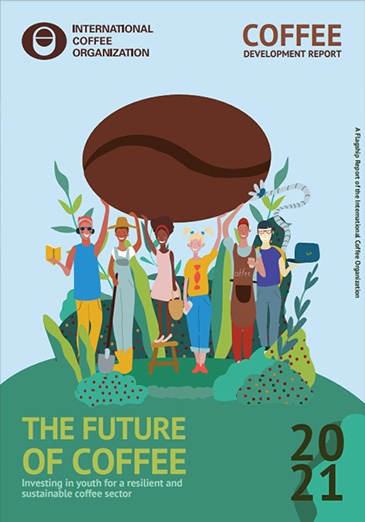FSG Professor Kwame Yeboah co-author on international Coffee Development Report
Flagship report stresses the importance of engaging young people in coffee farming and gives recommendations to address the role of youth
East Lansing, MI — It is critical for any system to invest in training the next generation of business workers and owners to avoid disruptions in production. This is particularly true for coffee, which is experiencing an aging farmer population while its demand continues to rise due in part to increasing consumption in emerging economies and a stronger interest in specialty coffee and product innovations in developed countries, as well as increasing domestic consumption in coffee producing countries. Dr. Kwame Yeboah, coordinator for the Alliance for African Partnership (AAP) Youth Transformation Platform, led a team of four researchers and undergraduate students to explore barriers and opportunities to youth engagement with global coffee production.
“There is an aging farming population, but there may not be a younger generation that is willing to farm or help continue the production of coffee,” Yeboah explains. “So, although the demand for coffee is growing very rapidly, we are not seeing more young people going in to cultivate it, especially in the coffee producing countries.”
 The goal of this project was to produce a report to inform all stakeholders in the Coffee Global Value Chain (C-GVC) of the urgency to invest in youth for a resilient and sustainable coffee sector. The stakeholders include policy makers in coffee producing countries (CPCs), international development agencies, non-governmental organizations (NGOs), bilateral and multilateral development institutions, as well as private companies engaged in the C-GVC.
The goal of this project was to produce a report to inform all stakeholders in the Coffee Global Value Chain (C-GVC) of the urgency to invest in youth for a resilient and sustainable coffee sector. The stakeholders include policy makers in coffee producing countries (CPCs), international development agencies, non-governmental organizations (NGOs), bilateral and multilateral development institutions, as well as private companies engaged in the C-GVC.
“Every year the International Coffee Organization (ICO) present a flagship report,” Yeboah explained. “I look at citizen youth in agriculture, and this year ICO wanted a report focused on youth and youth livelihood issues, which is how I got engaged in it.”
Yeboah and his team carried out this project through three phases: 1) conducting a desk review of existing literature, 2) analyzing secondary data, and 3) interviewing key informants from various areas of the C-GVC.
“Many of the industry professionals interviewed for this report highlighted the catalytic role youth can play in infusing technology in the sector,” said Yeboah. “They noted the large innovative and entrepreneurial spirit present in young people and often described them as fast learners and technology savvy. The interviews with youth also indicated younger farmers tend to pick up recent technologies more easily and are often keen on increasing production through improved modern technologies.”
Yeboah’s team included five broad recommendations to the ICO for them to consider addressing the role of youth in C-GVC.
- Youth are the present and future of coffee.
- Young people can be valuable agents of change and catalysts for innovation and technology adoption that fosters sustainability and resilience in the coffee sector.
- Youth engagement facilitates intergenerational transmission of knowledge and technology, which is foundational to sustaining the coffee sector.
- Youth represent the next generation of coffee consumers and hence a significant future market that would sustain the coffee sector.
- If opportunities for skill development and gainful employment expands, youth could be a significant source of social transformation and market for coffee. On the other hand, lack of opportunities could transform them into agents of migration and social unrest that could disrupt coffee production.
Yeboah explained, “We should not just do something for the youth. We need to work with the youth, make sure they are included in the decision-making.” Yeboah’s message for the future of the global coffee industry is simple yet important: Coffee needs youth and youth need coffee.
“For youth to be engaged, young people will need the space, which is the voice and dialogue,” Yeboah said. “They will need productive resources, and they also need to learn the necessary skills. So, in order to meaningfully participate in the coffee value chain, the youth need space, skill, and resources.”
The researchers on this project included: Leonidas Murembya, Assistant Professor of Economics; Deepa Thiagarajan, Adjuct Faculty in the Department of Food Science and Human Nutrition; David DeYoung, Academic Specialist in AFRE; and Mariama Sow, Research Assistant in Economics.



 Print
Print Email
Email